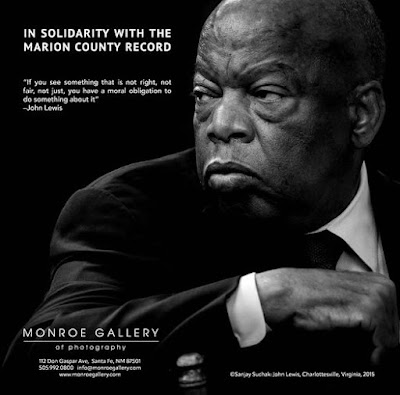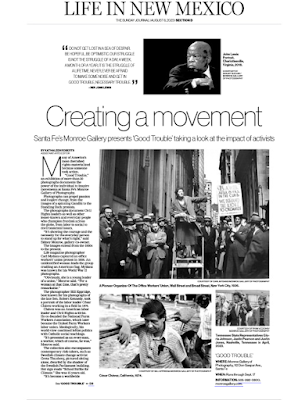August 23, 2023
"But we won’t forget that you took a stand when it mattered."
Joan Meyer, the 98-year-old co-owner of the Marion County Record, finally had her say Monday.
Boy, did we get a talking-to.
Meyer’s previous silence was sadly excusable. She died of cardiac arrest Aug. 12, a day after unconstitutional police raids on her home and beloved newspaper. But the whole world heard her loud and clear Monday, thanks to a video released by the Record showing her confrontation with officers.
Suffice to say, she had some choice words.
“Don’t you touch any of that stuff. This is my house!” she tells the police, who are clustered at the other side of the room around a table. “You ***holes. Get ’em out of here. They’re here.”
She then confronts an officer, vigorously pushing a walker ahead of her: “Does your mother love you? Do you love your mother? You’re an ***hole, police chief. You’re the chief? Oh, God. Get out of my house. You’re (unclear). Get out. Stand outside. You can stand outside that door and still see him. I don’t want you in my house.”
The video continues, with Meyer muscling herself and the walker past two officers to see exactly what was happening at the table.
“What are you doing?” she demands. “Those are personal papers.”
An officer limply explains the now-withdrawn search warrants, and Meyer responds with: “You people —” before the footage cuts off.
Those following the Marion County fiasco since Kansas Reflector broke the story probably have conjured an image of Meyer in their mind. She was a sweet elderly lady, gentle and caring, face wreathed with white curls and harboring angelic disposition. Accounts written after her death painted her as a community fixture, someone who dedicated 60-plus years to the newspaper.
Sure, she was many of these things, at least some of the time. But we can also see that she was a tart-tongued firebrand, not just feisty in the face of adversity but downright impassioned.
The police raid may have led to Meyer’s death. It most certainly did not break her spirit or misdirect her moral compass.
Watching the video, I thought about both of my grandmothers. They were each about her age, which meant their youths were shaped first by the Great Depression and then by World War II. My maternal grandmother went to work for Pratt and Whitney’s aircraft engine division during the war and stayed on at the Veterans Administration a few years afterward. Once my grandfather retired, she went to business school and landed a new job. My paternal grandmother spent her career as a schoolteacher in southeast Kansas and kept tutoring after she retired.
They were tough ladies. They raised families, loved grandchildren and didn’t stand for malarky. Although they both died some dozen years ago, I miss them still.
Would either have reacted like Meyer, cussing out local police, if officers had intruded on their homes and families?
I can only guess. But between the two of them, I bet at least one would have tried.
Meyer tried. She was still here. She had survived the passings of so many other people of her generation, and from the available video clip, she had no plans to go anywhere. That makes the overreach of Marion County Police Chief Gideon Cody and Magistrate Judge Laura Viar even less tolerable. They not only violated the First Amendment. They appear to have contributed to this newswoman’s death.
As Kansas House Minority Leader Vic Miller said Tuesday: “It had literally grave consequences in this instance, with the mother passing away. I’ve watched the video, there’s no doubt in my mind that the stress of this event added or contributed to her loss. But the chilling effect, the absolutely chilling effect that this can have on the rest of our press is intolerable.”
All of us need similar courage today. We face assaults on individual rights and freedoms from all directions. Leaders at the Kansas Statehouse have been more than happy to target minority groups for political advantage, pamper the privileged and spread lies about people in need. They expect us to blithely take it and treat them politely along the way.
Listen, I don’t advocate cussing out anyone. At least not instantaneously. But at a certain point, raising your voice for justice and freedom doesn’t just make sense. It’s the only way to be heard.
We hear you, Joan Meyer. Your loss stings. But we won’t forget that you took a stand when it mattered.
Clay Wirestone is Kansas Reflector opinion editor. Through its opinion section, Kansas Reflector works to amplify the voices of people who are affected by public policies or excluded from public debate.





